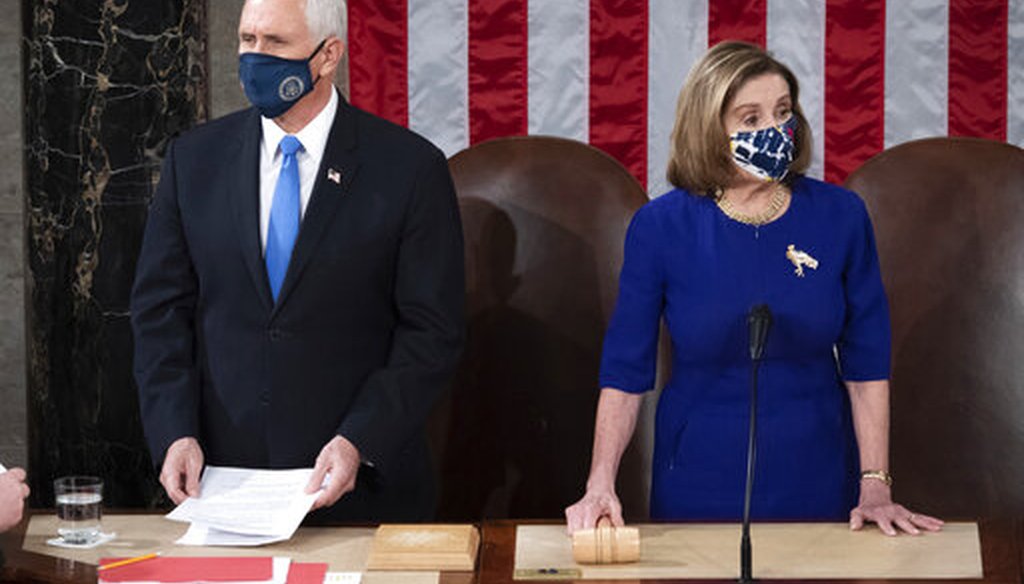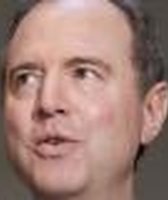Stand up for the facts!
Our only agenda is to publish the truth so you can be an informed participant in democracy.
We need your help.
I would like to contribute

Vice President Mike Pence presides over a joint session of Congress on Jan. 6, 2021. Speaker of the House Nancy Pelosi, D-Calif., is at right. (Pool via AP)
If Your Time is short
-
Rep. Steve Scalise, R-La., for months has said that states didn’t follow the election laws passed by their own legislatures.
-
Amid the COVID-19 pandemic, many state officials issued orders or announcements to change election procedures, such as making it easier to cast a ballot by mail.
-
Courts turned away legal challenges seeking to void election results over such changes.
Nearly one year after Joe Biden won the presidential election, some Republicans still stand by the falsehood that the election was stolen. One of their arguments is that state officials improperly changed election policies due to the pandemic.
That’s what Rep. Steve Scalise, R-La., repeated in an Oct. 10 interview with Chris Wallace on "Fox News Sunday." Scalise, the No. 2 House Republican, wouldn’t say whether he thought the election was stolen. But he rehashed a talking point he has used for months to question the validity of the result: accusing state officials of doing an end run around election laws passed by their own legislatures.
"If you look at a number of states, they didn't follow their state-passed laws that govern the election for president," Scalise said Oct. 10. "That is what the United States Constitution says. They don't say the states determine what the rules are. They say the state legislatures determine the rules."
Scalise’s claim draws on a legal doctrine based on a strict reading of Article 2 of the Constitution. But it ignores the fact that courts have shut the door on challenges based on his argument, made in dozens of lawsuits by Donald Trump and his allies seeking to invalidate certified election results. It also ignores that some election officials have powers to set rules without legislative changes, especially during emergencies.
RELATED VIDEO
Sign up for PolitiFact texts
We asked a spokesperson for Scalise for evidence to back his claim and did not hear back. But his statement mirrors the argument by Texas Attorney General Ken Paxton, who in December sued four battleground states that went for Biden, arguing that their election procedures violated their state laws.
"Using the COVID-19 pandemic as a justification, government officials in the defendant states of Georgia, Michigan and Wisconsin and the Commonwealth of Pennsylvania usurped their legislatures' authority and unconstitutionally revised their state's election statutes," Paxton wrote. He asked the court to bar those states from sending their votes to the Electoral College.
In a one-page ruling, the U.S. Supreme Court declined to hear Paxton’s suit, concluding that Texas had no business challenging the way other states conduct their elections.
Some states did change election procedures without legislation, including some that supported Donald Trump. But experts said this is common.
"It is often the case that there are gaps in election statutes that state and local election officials routinely fill according to their delegated authority," said Rebecca Green, an election law professor at the College of William and Mary. "So to say that all decisions about how elections are run must emanate from the legislature is not consistent with explicit delegated authority to state election officials."
She added: "No statutory scheme can cover every required decision and contingency in election administration, especially in pandemic conditions."
Facing the challenge of conducting elections during the COVID-19 outbreaks in the spring and fall of 2020, many states made changes to election procedures. Some of those actions were bills passed by state legislatures while others were orders or executive actions by governors or state election officials.
Many of these orders postponed primaries or made changes to encourage voting by mail. In Michigan, which supported Trump in 2016, Secretary of State Jocelyn Benson, a Democrat, announced in May 2020 that the state would send all registered voters an absentee-ballot application. Paxton cited Benson’s action in his lawsuit, but the Michigan Court of Appeals ruled in September that Benson acted lawfully. Michigan’s constitution includes the right to vote by absentee ballot in the 40 days before an election.
These changes were made not only in Democratic or battleground states, but also by Republican officials in solidly pro-Trump states:
-
North Dakota Gov. Doug Burgum issued an order in March 2020 suspending the requirement that each county operate at least one in-person polling place for counties that approved voting by mail.
-
Arkansas Gov. Asa Hutchinson issued an executive order allowing concerns about COVID-19 to be a valid excuse to vote by absentee for the November election.
-
In Paxton’s own state, Texas Gov. Greg Abbott added extra days of early voting for the general election, citing challenges posed by the pandemic.
But Paxton’s suit cited changes only in four battleground states that went for Biden.
For example, in Wisconsin, Paxton argued that the addition of ballot drop boxes violated state law because the law says mail ballots must be "mailed by the elector, or delivered in person to the municipal clerk issuing the ballot or ballots." The Wisconsin Supreme Court rejected a lawsuit seeking to ban absentee ballot drop boxes, concluding that the issues were not "cleanly presented."
In Georgia, the state Democratic Party and the secretary of state reached a settlement in March 2020 to give voters time to fix rejected ballots over signature issues. Paxton argued that the changes in the settlement were not ratified by the state Legislature.
The arguments by Paxton and Scalise are based on what election law scholars call the independent legislature doctrine. The gist of it is that Article 2 of the Constitution empowers state Legislatures specifically to choose how electors are selected and to set the time, place and manner for congressional elections.
"In practice, these clauses have been understood as allowing the legislature to set the ground rules for conducting the election, which are then subject to normal state processes: election administrators fix the details for administering the vote, state courts interpret the meaning of state election rules, and sometimes judges and officials decide when state rules violate state constitutional rights to vote," said Rick Hasen, an election law expert at University of California, Irvine, in an article for Slate.
Republicans, however, have used the doctrine to look for ways to help GOP-controlled state legislatures have the final say or to challenge certain pandemic election rule changes. They argue that the U.S. Constitution singled out state legislatures — not governors, election officials or state courts — as holding the power over federal elections.
Nathaniel Persily, an election-law expert at Stanford, told the New Yorker that the doctrine gives "intellectual respectability" to an otherwise "anti-democratic argument."
The doctrine came up in a Pennsylvania case when the state Supreme Court ruled that a state law that says only those mail-in ballots that arrive by Election Day can be counted violated the state constitution, Hasen wrote. The court extended the deadline for accepting ballots by three days. Republicans challenged the ruling, arguing that the state legislature is supreme. In the U.S. Supreme Court, Justice Samuel Alito said that the ballots arriving in the three days after should be set aside pending a resolution, but ultimately those 10,000 ballots did not make a difference in Biden’s victory.
Some conservative justices expressed support for the doctrine in dissents, said Michael Morley, an election law professor at Florida State University. But the courts rejected the extreme remedies sought by Paxton, who sought to block four states from casting votes in the Electoral College.
Such challenges to election rule changes needed to have been raised before ballots were cast, said Ohio State University law professor Edward Foley. "The courts, therefore, were not going to penalize valid voters for alleged mistakes of election officials."
In a Minnesota case, days before the election, a court sided with Republicans who challenged a change by election officials over mail ballot deadlines. The U.S. Court of Appeals for the Eighth Circuit, citing Article 2 of the Constitution, ruled that an extended deadline for mail ballots likely violated the Constitution because the secretary of state has no power to override the state Legislature.
"There is no pandemic exception to the Constitution," the court wrote, ordering that late-arriving ballots be set aside.
On the other hand, many states have laws that allow officials to suspend statutes or regulations due to emergencies such as a pandemic. Some of these emergency laws are specifically about elections, while others are more broad.
After Hurricane Michael hit north Florida in 2018, then-Gov. Rick Scott cited these emergency laws in his order to lift some rules related to mail ballots and in- person voting.
Scalise's argument was the basis of several Republican-backed lawsuits challenging changes to election procedures, but no court agreed to a remedy that would have changed the fact that Biden won the election.
RELATED: Fact-checking Hawley’s claim about Pennsylvania’s election law
Our Sources
Fox News Sunday, Transcript, Oct. 10, 2021
Rick Hasen in Slate, Trump Is Planning a Much More Respectable Coup Next Time, Aug. 5, 2021
NPR, 'Dark Money' Is Funding The 2020 Election Challenge — And Could Challenge 2024
National Conference of State Legislatures, COVID-19 and 2020 Primary Elections, July 2, 2020
National Conference of State Legislatures, Absentee and Mail Voting Policies in Effect for the 2020 Election, Nov. 3, 2020
U.S. Supreme Court, State of Texas vs Pennsylvania, Georgia, Wisconsin and Michigan and the court’s ruling, December 2020
Mighican Secretary of State Jocelyn Benson, Benson: All voters receiving applications to vote by mail, May 19, 2020
Arkansas Gov. Asa Hutchinson, Governor Hutchinson Proclaims COVID-19 A Valid Reason to Vote Absentee, Aug. 7, 2021
Texas Tribune, Gov. Greg Abbott extends early voting for November election by six days, starting Oct. 13, July 27, 2020
Milwaukee Journal-Sentinel, Wisconsin Supreme Court throws out latest election lawsuit because the issues weren't 'cleanly presented' June 25, 2021
Atlanta Journal-Constitution, Lawsuit settled, giving Georgia voters time to fix rejected ballots, March 7, 2020
SCOTUS Blog, Carson v. Simon, 2020
PolitiFact, Steve Scalise won’t say election was not stolen. Who else won’t? Feb. 24, 2021
PolitiFact, Joe Biden is right that more than 60 of Trump’s election lawsuits lacked merit, Jan. 8, 2021
Email interview with Rebecca Green, co-director of the Election Law Program, a joint project of the William and Mary Law School and the National Center for State Courts, Oct. 13, 2021
Email interview with Rick Hasen, election law professor at the University of California-Irvine, Oct. 13, 2021
Email Interview with Edward Foley, Ohio State University law professor, Oct. 13, 2021
Email interview, Robert Yablon, election law professor at University of Wisconsin Madison, Oct. 13, 2021
Email interview, Michael Morley, Florida State University election law professor, Oct. 13, 2021












































